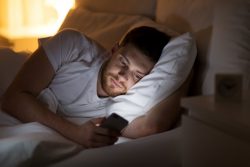Cell Phones and Sleep Apnea: A Double-Whammy for Poor Sleep
June 15, 2021
Do you enjoy scrolling through social media or playing games on your smartphone before you go to sleep each night? While that might seem like a harmless habit, you could actually be damaging your health! This blog post will discuss how cell phones and sleep apnea in Vero Beach can adversely affect your nightly rest. You’ll also discover a few tips to promote high-quality sleep.
Electronic Devices and Your Sleep Cycle
There are quite a few different forms of light, one of which is blue light. The sun is the primary source of blue light that we are exposed to during the day. It helps the human brain to be alert, boosting reaction times and even having a beneficial effect on mood. Additionally, it suppresses the secretion of melatonin, a hormone that induces drowsiness. When the sun goes down, you may begin to feel tired, partially due to your decreased exposure to blue light and an increase in melatonin levels.
Unfortunately, electronic devices emit blue light. Therefore, they stimulate the brain and interfere with your body’s circadian rhythm (the roughly 24-cycle that tells your body when to sleep and when to wake up). Research has shown that people who use their electronic devices right before bedtime tend to stay awake later and feel more tired in the morning.
This problem may be especially concerning for people with obstructive sleep apnea (OSA), which is a condition that causes disruptions in breathing throughout the night and interferes with the sleep cycle. Falling asleep later than desired due to blue light exposure can exacerbate the problems caused by OSA.
What You Can Do
To address the issues caused by OSA and nighttime exposure to blue light, you can try:
- Avoiding use of your smartphone or tablet during the last two hours before bedtime. Reading printed material, such as a book or magazine, may help you to relax without negatively affecting your sleep. It may be smart to keep your devices outside of your bedroom.
- Activating the blue light filter on your device (if you cannot resist the urge to use your devices at night). Any type of light can disrupt sleep, but blue light is the most damaging wavelength. You could also try wearing glasses that block blue light.
- Exposing yourself to plenty of bright light during the day. This can help your body to adopt a healthy circadian rhythm.
- Investigating available treatments for OSA. A CPAP or custom oral appliance can help you to breathe easily throughout the night and improve the quality of your rest.
Is your favorite electronic device stealing your sleep? A few adjustments to your nighttime routine may help you rest better.
Meet the Sleep Apnea Expert
Dr. Kenneth Mogell is a Diplomate of the American Board of Dental Sleep Medicine. He has been helping patients conquer sleep apnea via oral appliance therapy for more than 10 years. If you are concerned about the quality of your rest, he would be pleased to consult with you. Contact our Vero Beach office at 772-882-6800.
